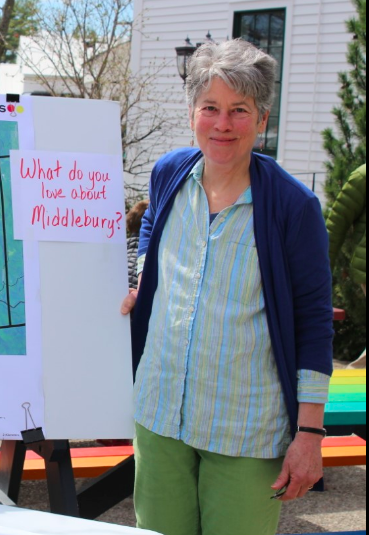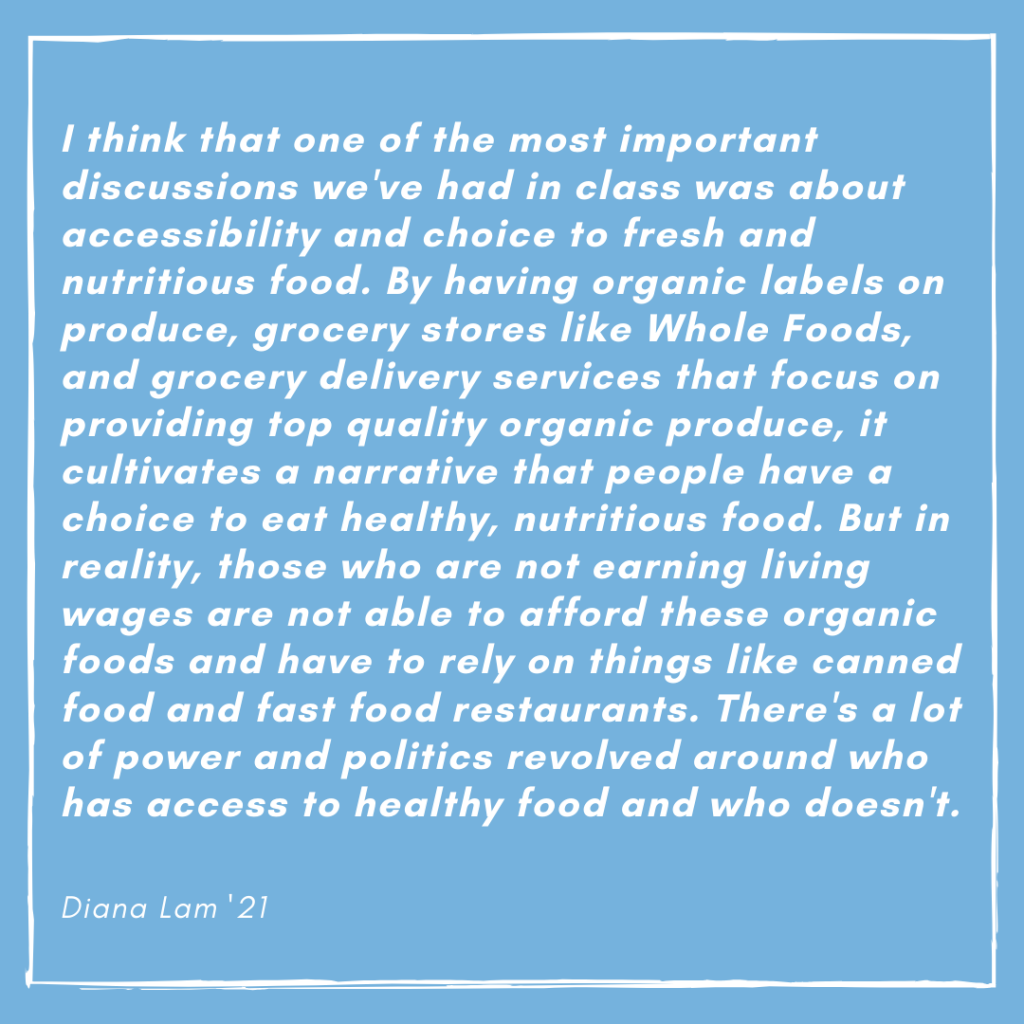Read below for our full interview with P&P faculty partner Molly Anderson regarding her course Food, Power, & Justice. Prof. Anderson discusses community-based learning, the class’s recent visit to Starksboro, and the transition to remote learning.
Professor Molly Anderson is one of many faculty members who partner with the CCE’s Privilege & Poverty (P&P) program to bring classrooms and communities together to address the causes and consequences of poverty. As one of P&P’s foundations courses, her class Food, Power, and Justice (FP&J) enables students to more deeply examine the causes and consequences of economic inequality through a specific disciplinary lens.
From Professor Anderson‘s course description, FP&J allows students to “learn to analyze power and justice in relation to the food system.” Through the class, students examine instances in which different groups of people may be experiencing food injustice, such as inequitable access to food, inequitable health outcomes related to diet (e.g. obesity, diabetes, etc.), injustice in opportunities related to food production, and silencing or lack of political participation.
An important component of the course included visiting the village of Starksboro, VT., where students were able to connect their class learning to people’s actual experiences. There, students prepared a community meal at Robinson Elementary School and talked with members of the community about food insecurity, and ways to improve accessibility of services through models like the Rural Fun Delivery (RFD) program supported by Mary Johnson Children’s Center (MJCC). For the past five summers, P&P has sponsored a Shepherd summer intern who delivers meals, social support, and activities to over 250 youth in underserved areas of Starksboro through the RFD program. While the RFD program benefits many, however, the need for more accessible efforts remains, especially for Starksboro’s most isolated individuals.
2019 RFD summer intern Peter Mehler worked with Professor Anderson, CCE Assistant Director Jason Duquette-Hoffman, and MJCC’s School-Age Programs Coordinator Anne Gleason to plan the Starksboro event and do outreach in the community. The community outreach partnership project of the Food, Power, and Justice class help to inform next summer’s RFD program to make it more accessible, and one of the current students in the class has been selected for the RFD internship. The project was funded with an AOE grant.
We interviewed Professor Molly Anderson about Food, Power, and Justice, and gained insights into the course’s importance as well as how it has been affected by the college’s transition to remote learning.

When did you start incorporating experiential learning opportunities into your coursework, and what prompted you to do so?
I’ve been incorporating experiential learning opportunities into my courses for as long as I’ve been teaching — I think it’s impossible to teach about food systems without the experiential side. Students need to understand the very hard work involved in farming and food-service jobs in ways that go beyond reading about it.
What has your partnership with the P&P Academic Cluster looked like?
I’ve been a faculty partner with P&P since about a year after it started. I attend as many of the events as I can, and try to support students. This year, I worked much more closely with Jason Duquette-Hoffman in setting up a project-based learning experience in Starksboro, and that was great for me even though the project was cut short by COVID-19. Jason was tremendously helpful in organizing trips to Starksboro and keeping me connected with the Mary Johnson Children’s Center, in addition to planning what students could do.
How have community connected experiences deepened your students’ understanding of power imbalances in the food system?
I think just visiting Starksboro was a bit of a surprise for many students. They realized quickly that there aren’t any grocery stores, and there are a lot of people struggling with hardships. At the same time that they were seeing the disadvantages that some people in our county live with, they saw that people in the community really cared about their neighbors.

What have you learned about yourself or the world through community-connected work?
I’ve learned that communities are really complex and tightly-knit. It’s not possible to just show up with a good idea and expect people to pay attention. Communities need to generate ideas on their own, and the best I can do is try to support them. I’ve never felt a need to be recognized as “the expert in the room,” but community-connected work would bash that desire very quickly!
How are you adapting the course to remote learning?
Some of my students are trying to find ways to engage in their home communities with programs that are popping up to help meet food needs for kids and lower-income families. There has been an amazing outpouring of volunteer service in most communities, and I’ve encouraged students to find out what is happening around them and help, if they can do so safely. We had a Discussion Forum right after break where students reported what they were seeing around them, and the responses ranged from hearing sirens all night in New York City to living in a very conservative rural community that thought COVID-19 was a hoax.
Thank you, Professor Anderson!
Stay tuned for more stories relating to this class, community-based projects by students, and more. We hope you are staying safe and healthy.
